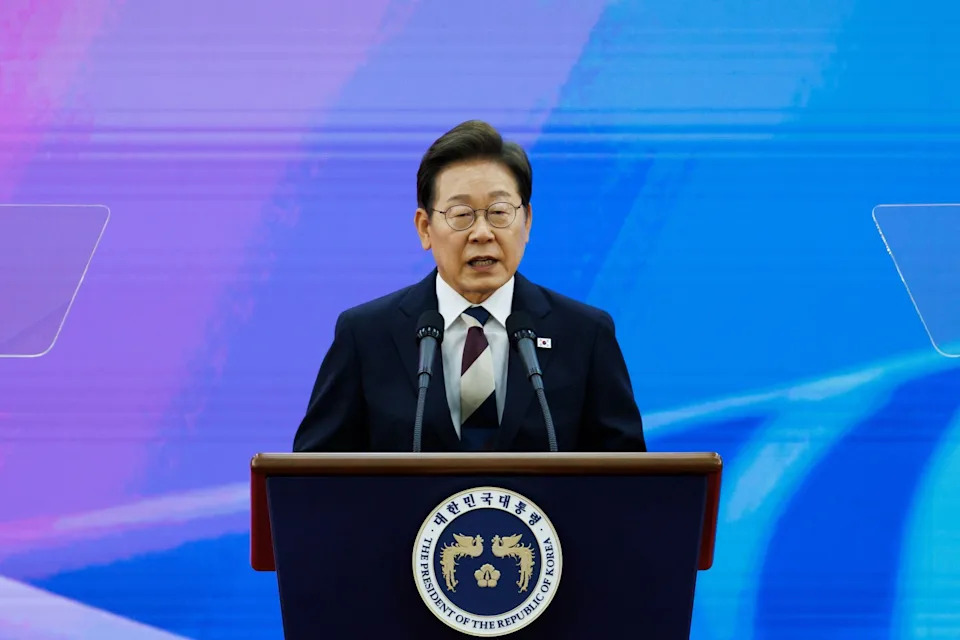(Bloomberg) — South Korea’s newly elected President Lee Jae-myung took office with a pledge to revive a national economy threatened by Donald Trump’s tariffs just as the US president doubled duties on steel and aluminum, highlighting the pressing challenges facing the Asian leader.
“We will start by restoring people’s livelihoods and reviving the economy,” Lee said at an inauguration ceremony at the National Assembly in Seoul on Wednesday, hours after he won the country’s presidential election. “We will revive the virtuous cycle of the economy by using the national budget as a catalyst.”

Lee’s first day in office was greeted by Trump’s raising of import taxes on steel and aluminum to 50% from 25%. South Korea also faces a 25% across-the-board levy that was later temporarily reduced to 10% for 90 days, in addition to sectoral tariffs imposed on cars, steel and aluminum.
Trade talks with the US will provide an early test of Lee’s ability to balance foreign policy ties with domestic concerns, with exports equivalent to more than 40% of South Korea’s gross domestic product. Lee, who is expected to speak to Trump soon, has said policymakers shouldn’t rush into a deal with the US.
Lee earlier said he’d “crawl through Trump’s legs if needed” to get a good deal for South Korea.
Tuesday’s vote was largely seen as a referendum on Lee’s ousted predecessor’s botched attempt to impose martial law in the longstanding US ally. Lee won the race with 49.4% of the vote, a comfortable victory over the conservative People Power Party’s Kim Moon-soo, though not the landslide that looked possible earlier in the year.
On the campaign trail, Lee said he would use up to 35 trillion won ($25.4 billion) in a stimulus package if elected to provide aid to households and businesses. That was already an increase from the 30 trillion won figure he started the campaign with.
The sense that Lee’s administration will be looser on fiscal policy than Yoon Suk Yeol’s appeared to ripple through bond markets, pushing the price of 10-year futures on government debt down by more than 100 basis points. Still, stock investors cheered the prospect of a return to political stability and corporate governance reforms.
The Kospi Index jumped as much as 2.5% on Wednesday, taking its gain from the April low to more than 20% as investors piled into potential beneficiaries of Lee’s reform and growth agenda.
In a speech heavy on rhetoric about uniting the nation, Lee also vowed to continue efforts to step up trilateral cooperation with the US and Japan based on a strong alliance with the US and a practical approach to diplomacy.
But in a departure from the Yoon administration’s hardline stance on North Korea, Lee said South Korea will seek to restore communication channels with North Korea. Any dialogue would take place from a position of strength he said, adding that South Korea’s defense budget is twice the size of North Korea’s economy.
“No matter how expensive peace is, it is better than war,” Lee said. “It is better to win without fighting than to win by fighting, and the most reliable security comes from a peace without the need to fight.”
The US congratulated Lee on his victory and pledged to continue coordinating security efforts in a bid to modernize their alliance.
“The United States and the Republic of Korea share an ironclad commitment to the Alliance grounded in our Mutual Defense Treaty, shared values, and deep economic ties,” US Secretary of State Marco Rubio said in a statement. “We will also continue to deepen U.S.-Japan-ROK trilateral cooperation to bolster regional security, enhance economic resilience, and defend our shared democratic principles.”
Demonstrating the pressing security challenges facing the new leader, a top security aide to Russian President Vladimir Putin, Sergei Shoigu, arrived in Pyongyang for talks with North Korea’s Kim Jong Un, Tass reported Wednesday.
Shoigu’s visit, following his March trip during which he briefed Kim on US-brokered negotiations to end the war in Ukraine, comes two days after Moscow and Kyiv agreed on a new exchange of prisoners during their second round of peace talks in Istanbul.
Shoigu and Kim are set to discuss the situation around Ukraine and bilateral military ties, including “immortalizing” North Korean troops who fought against Ukraine alongside Russian troops, Interfax said.
Kim has emerged as a key ally of Putin since they struck a military treaty a year ago, and his deployment of soldiers raised concerns about the North Korean military’s exposure to the real-world and modern combat experience.
Lee appointed Wi Sung-lac, a member of his Democratic Party who was once South Korea’s top nuclear negotiator with North Korea, as his national security advisor. Lee’s top campaign aide and DP lawmaker Kim Min-seok was nominated as the prime minister and Lee Jong-seok, who served as South Korea’s unification minister in 2006, was named the country’s spy agency chief.
—With assistance from Jaehyun Eom, Youkyung Lee and Sanjit Das.
(Updates with statement from US Secretary of State Rubio.)

